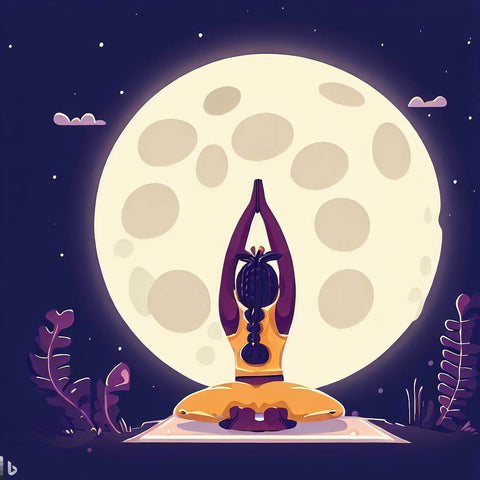Many women turn to iron supplements to ensure that they're getting their daily iron requirements. But can this affect your menstrual cycle and periods?
In this article, I'll take a look at the relationship between iron supplements and menstrual health. I'll also introduce you to our pioneering iron supplement that's gentle and easy to absorb.

Do Periods Cause Iron Deficiency?
During menstruation, the body loses blood. Since iron is a major component of hemoglobin, the protein in red blood cells that carries oxygen throughout the body, this means most women experience a decrease in iron levels. The more you're bleeding, the more iron you'll lose.
It's useful to know what actually happens when you get your period.
The menstrual cycle involves the shedding of the uterine lining, which is a blood-rich tissue. When this tissue is shed, it results in blood loss through the vagina.
The average blood loss per period is about 30 to 40 millilitres, but it can vary widely. Some women may lose as little as 10 millilitres, while others lose more than 80 millilitres. Since each millilitre of blood contains about 0.5 milligrams of iron, this can really affect your iron stores.
Can Periods Lead to Iron Deficiency Anemia?
Yes, heavy periods can lead to a depletion of the body's iron stores and, in some cases, iron deficiency anemia.
According to this study, 5%–10% of women with iron deficiency anemia have a menstrual disorder (menorrhagia).
If you suspect that your periods are causing iron deficiency, you should consult a doctor or health practitioner who can help you test with a physical exam and a complete blood count.
According to this study, blood loss of 40 ml during menstruation yields an average loss of 1.6 mg of iron.
What are the Symptoms of Heavy Periods?
The main symptoms of heavy periods (menorrhagia) include:
- Bleeding that lasts more than 7 days
- Soaking through one or more tampons/pads every hour for several hours
- Needing to use double sanitary protection
- Passing large blood clots (quarter-sized or larger)
- Fatigue and weakness due to anemia
- Severe cramping or pain
If you experience these symptoms, consult a healthcare provider for proper evaluation and treatment.
Do Reduced or Increased Iron Levels Cause Changes in Menstruation?
According to this study in the International Journal of Hematology Research, iron supplementation in women with iron deficiency anemia was associated with menstrual changes in 50% of patients.
These changes included:
However, in this study of 160 non-anemic female students there was no statistically signifcant evidence.
Does Taking Iron Make Your Period Heavier?
There is conflicting evidence about whether taking iron can make your period heavier.
This study from 2016 noticed menstrual changes in about 50% of patients.
However, this randomised clinical trial showed no link.
Can I Take Iron Pills While on my Period?
Yes, you can take iron pills while on your period. Taking iron supplements during your period can help replenish the iron lost through menstrual blood and support your overall iron levels.
I always recommend following the dosage recommended by your practitioner, as excessive iron intake can be harmful.
Does Iron Supplementation Help with Period Cramps?
There isn't strong evidence to suggest that iron supplements can alleviate menstrual cramps (dysmenorrhea). However, maintaining adequate iron levels helps maintain your overall wellbeing as well as indirectly influencing how you experience and manage period symptoms.
For specific relief from period cramps, other treatments such as non-steroidal anti-inflammatory drugs (NSAIDs), heat therapy, and certain lifestyle changes are more commonly recommended.
Best Practices for Taking Iron Supplements During Your Period
-
Choose a high-quality iron supplement that does not cause you gastrointestinal side effects, such as nausea or constipation, such as nano iron.
-
Take conventional iron supplements only with food: If you're taking old fashioned iron supplements always do so with food to improve absorption and reduce the risk of gastrointestinal side effects. Foods that are high in vitamin C, such as citrus fruits and tomatoes, can also enhance iron absorption.
Of course, if you're using Nano Iron you should have an empty stomach when you take it to get the best absorption - taking with food may reduce how much you absorb. -
Avoid taking iron supplements with dairy or caffeine: Dairy products and caffeine can interfere with the absorption of iron, so it's best to avoid taking iron supplements with these types of foods or beverages.
-
Stick to a consistent schedule: Taking iron supplements at the same time each day can help ensure that you're getting a consistent amount of iron in your system. This may also help reduce the risk of gastrointestinal side effects.
FAQ's on Iron Supplements & Menstruation
Can taking iron supplements delay your period?
Iron supplements do not typically delay periods, according to most experts. However, it's important to consider that the menstrual cycle can be influenced by a variety of factors, including stress, life changes, hormonal imbalances, certain medical conditions, and changes in diet or medication.
Can iron supplements reduce menstrual flow?
Iron supplements, in themselves, do not cause a reduction in menstrual flow. The menstrual flow is primarily regulated by hormonal balances and other physiological factors, not directly by iron levels in the body.
If someone experiences a change in their menstrual flow while taking iron supplements, it is likely due to other factors. It's important to consult a healthcare professional for a proper assessment, as changes in menstrual flow can be indicative of various health conditions.
Should You Take Iron During Your Period?
You need to maintain a proper balance of iron through a balanced and varied diet. If you find you are low on iron during this time, then yes, you may want to take an iron supplement that works for you. We recommend you do this in conjunction with regular iron level tests and the advice of a qualified health practitioner.
